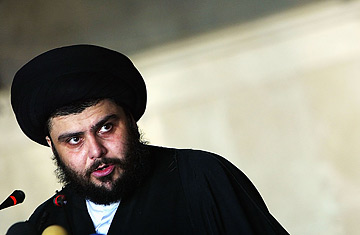
Shiite cleric Moqtada al-Sadr speaks to his followers on Nov. 24, 2006 during a Friday prayer service in Kufa south of Baghdad, Iraq.
Shi'ite cleric Moqtada al-Sadr threw down yet another challenge to the Iraqi government, demanding that policemen and soldiers Prime Minister Nouri al-Maliki fired for refusing to fight al-Sadr's militia be reinstated "after honoring them." On Sunday, Maliki's government announced the dismissal of more than 1,300 security personnel who deserted last month when fighting broke out between Iraqi government forces and the Mahdi Army in Basra. Sadr reacted swiftly to the news by issuing a statement from the Shi'ite holy city of Najaf Monday that said those who refused to take up arms against his militia were only doing their religious duty.
"Our brothers in the army or police who gave up their weapons to their brothers were only obeying their grand religious leaders," declared Sadr's statement. "So I call on the official authorities to reconsider their termination order." Sadr's exact whereabouts remain unclear, though he is rumored to have recently returned to Najaf after spending the past several months undertaking intensive religious studies in Iran.
The demand, which came before another burst of Sunni insurgent violence north and west of Baghdad, is unlikely to be heeded by Maliki. Still, it underscored the political weight of Sadr's voice. Sadr's Mahdi Army has effectively stopped an advance by U.S. and Iraqi forces into its strongholds in Baghdad and Basra after weeks of fighting. On Monday Maj. Gen. Jeffery Hammond, the commander of U.S. forces in Baghdad, said American troops operating at the edge of Sadr City in support of Iraqi troops would not press deeper into the area. That means any decisive push into the heart of the Mahdi Army stronghold in east Baghdad would be left to Iraqi security forces, which so far have been unable to deal any meaningful blows against the militia.
The conflict in Sadr City remained stalemated Tuesday. There were no reports of serious fighting, but Iraqi government forces clung to their foothold in the area by manning checkpoints. "The city still under siege," said Sadr City resident Ghofran al-Saidi, a member of parliament loyal to the cleric. "The Iraqi troops stopped me twice from going out although I told them who I am."
Sadr's political power appears to be growing even as the crisis wears on. A new report by Refugees International says the Mahdi Army ranks are swelling with new recruits drawn from internally displaced people who've gotten aid from the militia. "Displaced men have joined armed groups," said the report, which put the number of internally displaced people in Iraq at 2.7 million. "As a result of the vacuum created by the failure of both the Iraqi government and the international community to act in a timely and adequate manner, non-state actors play a major role in providing assistance to vulnerable Iraqis. Militias of all denominations are improving their local base of support by providing social services in the neighborhoods and towns they control. Through a 'Hizballah-like' scheme, the Shi'ite Sadrist movement has established itself as the main service provider in the country."
The report stressed that militant Sunni groups are drawing new followers as well, and Tuesday brought grim reminders of the continued presence of radical Sunni guerrilla fighters in Iraq. Twin car bombs, the signature terror weapon of Sunni militants in Iraq, exploded north and west of Baghdad. One blast in Baqubah, the provincial capital of Diyala Province, left some 40 people dead and wounded roughly 80 others, according to initial reports. Another explosion tore through Ramadi, a town which U.S. officials hailed as a success story in recent months because of its dramatically lower levels of violence. That attack killed 13 and left a similar number wounded.
